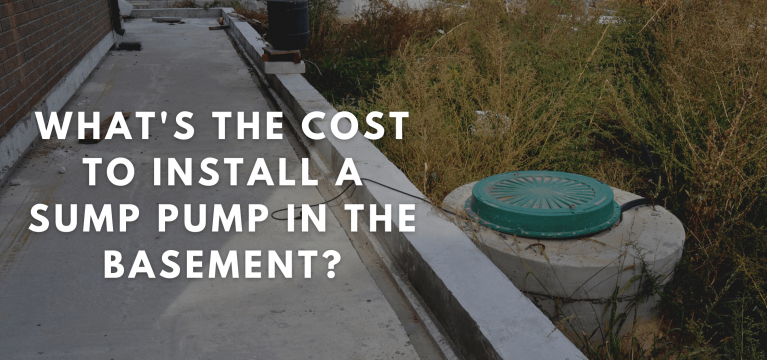If you’ve ever had a plumbing fiasco at your home, then you know firsthand how difficult and expensive it can be to clean up. Whether it’s a burst pipe, damaged sewage system, or sump pump problem, repair bills can be hundreds, if not thousands, of dollars. Sump pump replacement costs depend on many factors, such as the pump material, size, and horsepower. It’s important that you get any sump pump issues sorted sooner rather than later, considering how essential a home sump pump is to any property’s plumbing setup.
Here we will discuss the costs associated with sump pump replacement and installation.
How Much Does It Cost To Install A Sump Pump?
Sump pumps can be installed in houses with underground basements or crawl spaces and are often installed in new construction houses that may or may not be at risk for flooding and water damage. Installing a sump pump can be a costly process, but it can prevent flooding and water damage in the long run.
The national average ranges between $700 and $1,600, with most homeowners spending around $1,100 to install a new submersible sump pump. On the low end, you can install a new pedestal pump with minimal labor for around $300. On the higher end, some homeowners spend as much as $4,000 to install two new submersible sump pumps with several hours of electrical and plumbing labor to drill through old flooring and connect the system.
Sump Pump Basics
A sump pump is a submersible drainage pump hooked up to the sump pit, which is the in-ground pit that collects drain water. A sump pit is typically located in the basement, and it’s used to collect both natural groundwater and water from drains throughout the home and property. A sump pump works by pumping the pit water out away from the home to keep the basement and crawlspace dry.
Sump pumps come in different sizes depending on the required capacity and weather in your area. Keep in mind that a rainy day brings an average of about 20 inches or gallons of water per minute into the basement sump pit. You can estimate how much water is received per hour of rainfall to establish the necessary pumping capacity and the required size of your sump pump.
Sump Pump Maintenance
When you follow the right maintenance routine, a sump pump should last for about 10 years. It’s a decent investment, as having a new sump pump installed can cost anywhere from $100 to $3,000, although the average cost falls right around $1,000. If you notice signs that your sump pump is going out — such as strange noises, excessive vibration, or obvious rust — you may need to be prepared to cover the sump pump replacement cost.
Average Sump Pump Replacement Cost
It’s helpful to understand the difference between the cost to replace a sump pump and that to install a new sump pump. Generally, as with many components in your home, it’s cheaper to replace an existing unit than to install an entirely new one. That’s because the reservoir is already dug and the drainage is in place, so there are lower labor costs and less time involved. Standard sump pump replacement by a professional team is usually between $400 and $600, though the price goes up if you’re adding backup batteries or extra capacity.
Average Sump Pump Installation Cost
In terms of the cost to replace a sump pump or install a new sump pump, you can expect to pay more for an entirely new installation. This project requires more prep work to make way for the sump pump and, of course, time equals money in the home service industry.
These sump pump installation components can give you a better idea of what’s to come with new sump pump installation:
- Sump crock hole: A concrete saw is used to cut a hole before the sump crock placement.
- Sump crock installation: The crock connects to the drain tile to collect surplus water. It’s best to get a sump crock with a sealable top to keep radon gas from filtering into your home.
- Submersible pump installation: The watertight pump is sealed and submerged to pump water efficiently away from the basement or crawlspace.
- Exit pipe preparation: All water in the crock needs to be pumped through an exit pipe leaving the home. This is usually set up through a hole in the foundation wall, so the installation team will need to bore a hole before the rest of the work can continue.
- Outside dry crock dig: Contractors typically find a spot 6 to 12 feet outside the foundation and fill it with drain stone and sand.
- Electrical connection: If there’s no outlet nearby for connecting the sump pump, one must be installed before the sump pump can be safely plugged in.
Your submersible-sump-pump provider will likely give you an estimate that includes all these costs. The size and condition of your property may also play a role in how easy or difficult it is for contractors to complete these tasks.
End Words
Sump pumps are installed in sump pits dug in the lowest level of the basement. If water gets near the pit and the sump pump, the pump kicks on and pumps the water away from the building via sump pipes that either dump the water outside or back into the home’s wastewater system.
Your home is an investment, so if water gets into the basement every time it rains, it’s time to consider a sump pump. Call Plumbing 911 as soon as you suspect a plumbing problem. We can help you solve the issue before it turns expensive.













